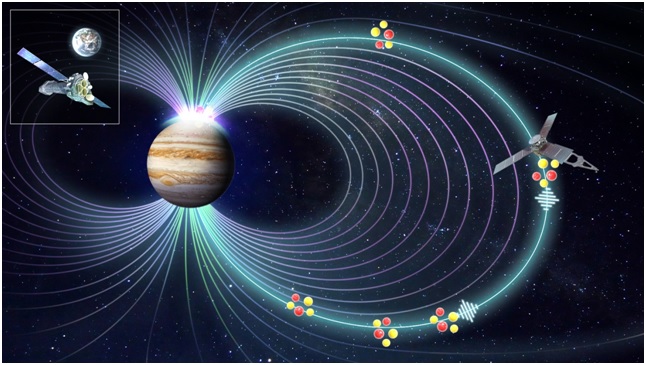Space Science Bazaar Webinar
Understand Planetary Spaces Remotely
The Stunning Auroral Displays
Speaker: Zhonghua Yao
14 October 2021
4 pm GMT+8
BEIJING — On 14 October 2021, Prof. YAO Zhonghua gave an online seminar on Undertand Planetary Spaces Remotely the Stunning Auroral Displays. The lecture was organized in the context of the ISSI-BJ "Space Science Bazaar" series that young scientists present their work within International Team Program of ISSI-BJ.
---
About the webinar

In 1957, the first human-made satellite Sputnik 1 was successfully launched and entered the Earth's orbit, inaugurating the space age. Since then, space-borne technologies have played a more and more important role in our daily life, up and beyond to reach other planets, inside and outside our solar system. We have since learnt much about planets and their environment, e.g., that space environments of Earth-like planets are mainly driven by the solar wind, while the ones of giant planets are driven by both external(solar wind) and internal sources (particles originating from the moons and rings).
Auroral emissions, including airglow, represent an important phenomenon for the remote study of space environment, as they have been observed on all planets of the solar system—with an exception of Mercury. Auroras share many similarities at different planets, but key differences have also been found, indicating both common driving mechanisms and unique planetary environments for each planet. Therefore, they may be seen as a universal phenomenon that most likely also takes place in other planetary systems. But what’s the purpose of studying space environments and planetary auroras?
The analysis of planetary auroral emissions provides crucial information to the understandings of the perturbations of particles and magnetic fields in planetary spaces. Charged particles and electromagnetic waves are key elements in space, and their perturbations could produce energetic particles hazardous to spacecraft and could result in geomagnetic perturbations threatening ground facilities, e.g., the power grid.
In this talk, Dr. Yao Zhonghua will introduce the auroral phenomena at the planets in our solar system, and he will discuss how we diagnose planetary space environments using the remotely detected auroral emissions.
Dr. Zhonghua Yao obtained his PhD from the Space Science Institute at Peking University in early 2014. His PhD thesis is on the drivers of electrical current system during magnetospheric substorms. He then joined Mullard Space Science Laboratory, University College London (MSSL/UCL) as a postdoctoral research associate, mostly working on particle data from Cluster, Cassini and MMS. He diverted into giant planetary sciences at the end of his MSSL trip in late 2016, and obtained a Marie-Curie COFUND fellowship at the Laboratory for Planetary and Atmospheric Physics (LPAP), University of Liege. Since then, Dr. Zhonghua Yao’s research focus is shifted to remote sensing observations of planetary aurorae and their magnetospheric environment, e.g., Jupiter’s moon Io torus. In late 2019, he took a faculty position in Institute of Geology and Geophysics, Chinese Academy of Sciences (IGGCAS), and is currently establishing a giant planetary research team.
Schedule
14 Oct.2021
4 pm (GMT+8) |
YAO Zhonghua – Understand Planetary Spaces Remotely (IT led by YAO Zhonghua) Watch |
18 Nov. 2021
10 am (GMT+8) |
ZHAO Lulu - Using Energetic Electron And Ion Observations To Investigate Solar Wind Structures And Infer Solar Wind Magnetic Field Configurations (IT led by Gang Li) |
2 Dec. 2021
4 pm (GMT+8) |
JIN Chichuan and Riccardo Middei – Active Galaxies in Crisis: A Statistical Study of Ultra-Violet Variability (IT led by Martin Ward)
|
27 Jan. 2022
4 pm (GMT+8) |
Sebastiano Lauro – Searching for Subglacial Water on Mars with Orbiting Ground Penetrating Radars (IT led by Roberto Orosei) |
17 Feb. 2022
4 pm (GMT+8) |
Yang Yanyan - Using Energetic Electron and Ion Observation to Investigate Solar Wind Structures and Infer Solar Wind Magnetic Field Configurations (IT led by Gang Li) |
3 March 2022
4 pm (GMT+8) |
Iiro Virtanen - Modelling Space Weather and Total Solar Irradiance over the Past Century (IT led by Alexei Pevtsov)
|
Sign up to the ISSI-BJ Newsletter or follow us on WeChat (ISSIBJ) to be always up-to-date and to not miss our seminars!